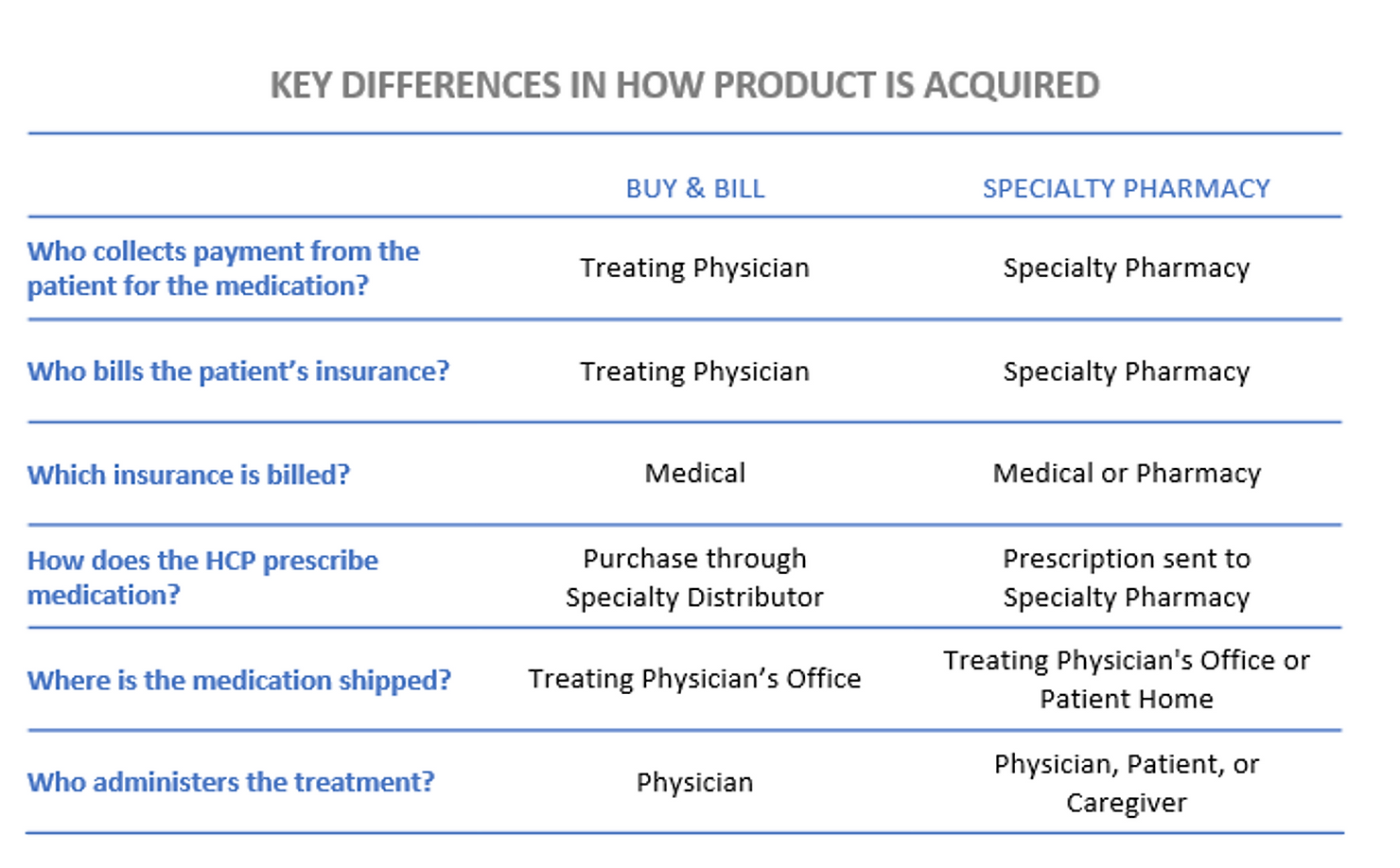How Product Acquisition Impacts Patient Support Offerings: Buy and Bill vs. Specialty Pharmacy

It’s essential to begin with a clear definition of these acquisition methods and what they mean:
-
- Buy and bill is how an HCP purchases the medication from a specialty distributor. After treating the patient, the HCP will submit a claim form to bill the patient’s insurer for reimbursement. Coverage typically adjudicates through a patient’s medical benefits, and the HCP will bill the patient for their cost-share portion of the medication and any administration-related fees.
- Specialty pharmacy, on the other hand, is when an HCP sends a prescription to the specialty pharmacy that carries the medication and that pharmacy directly bills the patient’s insurer for the medication. Coverage may be adjudicated through either the patient’s medical or pharmacy benefit, depending on the insurance plan, the type of medication, how it is administered, and other factors. The specialty pharmacy will bill the patient for their responsibility for the medication cost. (Note that the HCP may still bill the patient for office visit-related fees and/or product administration-related fees.)

Specific services that are important to consider for a buy and bill medication include the following:
-
- Site of care coordination – determining all sites of care that could acquire the product and coordinating between the prescribing and treating facilities, if applicable
- Distribution pathways – helping the HCP understand where and how they can acquire the medication and how the patient’s coverage, out-of-pocket responsibilities, and access may differ for each
- Billing and coding guidance – educating HCPs on how to bill for the medication, understanding claim form requirements by payer, and informing the applicable drug and procedural codes
- Claims support – providing claims review services to ensure claims include all required information before they are submitted to an insurer, as well as claims appeal services to assist HCPs in the instance that a claim has been underpaid or denied
- Sample or voucher programs – providing patients and HCPs with access to medication while the HCP works through product acquisition
- Medical copay program solutions – building a copay program that will provide reimbursement to the HCP or patient after treatment
Patient Support service offerings for a product obtained through a Specialty Pharmacy may need to include the following:
-
-
Specialty Pharmacy coordination – determining mandated specialty pharmacies, white-bagging coordination (as needed), reimbursement support, and working with the specialty pharmacy to ensure they receive the prescription and can ultimately fulfill the product, partnering to remove barriers to access along the way
-
Quick Start and/or Bridge programs – programs that are geared toward helping a patient initiate and stay on medication expeditiously while working to obtain coverage through the patient’s insurer on the back end
-
Patient education – providing tools, materials, and resources to help patients initiate and stay on therapy. Since most specialty pharmacy medications require a patient to self-administer (orally, via self-injectable, etc.)
-
Caregiver support – additional educational tools and resources intended specifically for caregivers who may be leading, assisting, or participating in product administration and/or other aspects of a patient’s treatment journey
-
Pharmacy copay program solution – building a copay program that will be applied before patient treatment so the patient doesn’t have a large out-of-pocket cost-share responsibility
-
If you are preparing to launch a patient support program and need strategic guidance on building your program, which services should be included, and how to best communicate with your patient and HCP customers, Archbow can help. We have deep expertise in designing and customizing patient support programs and distribution strategies based on critical factors related to your product, therapeutic area, and patient population. Contact us today to get started.
Archbow Consulting helps pharmaceutical and biotech companies in the USA and Europe design, build, and optimize product distribution and patient access strategies. Archbow was founded by industry veterans to meet a need in the marketplace for consulting options that offer diverse real-world experience, are able to leverage deep connections across the industry, and can also provide actionable strategic guidance. We invite you to learn more about our team, services, and clients’ success, and connect with us via email, LinkedIn or subscribing to this blog which you can do below.
Share in
Recent Posts
Navigating the Complex World of Pharmaceutical Returns Processing
Efficiently managing product returns is a critical lever for controlling costs, minimizing operational inefficiencies, and reducing end-to-end complexity.
What Happens in Vegas… Ends Up in Our Blog: Asembia 2025 Edition
Asembia 2025 clarified that the pharma landscape is rapidly evolving, with innovation and partnership as the driving forces.
Revolutionizing Patient Support: Creating a Seamless, Patient-Centered Experience
Building a coordinated access model is no longer just a difference – it’s a competitive necessity.
SUBSCRIBE
Subscribe to receive news and updates from Archbow Consulting
|
|


